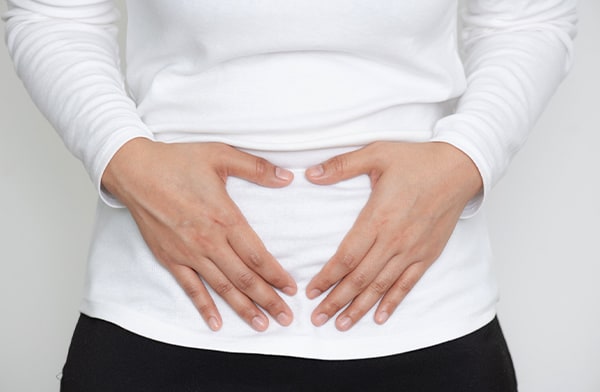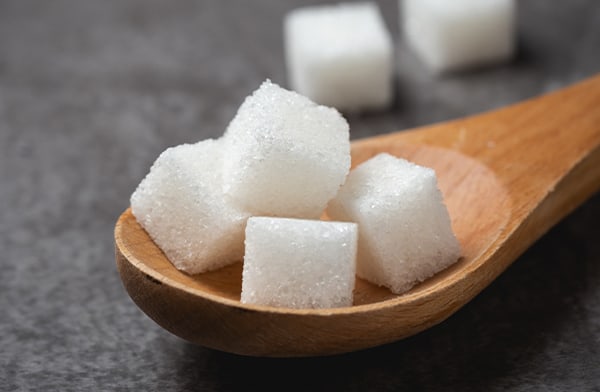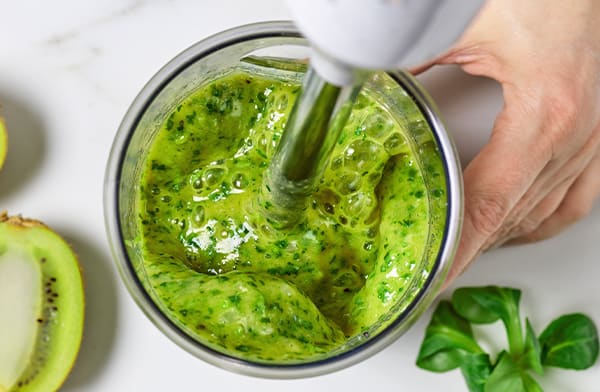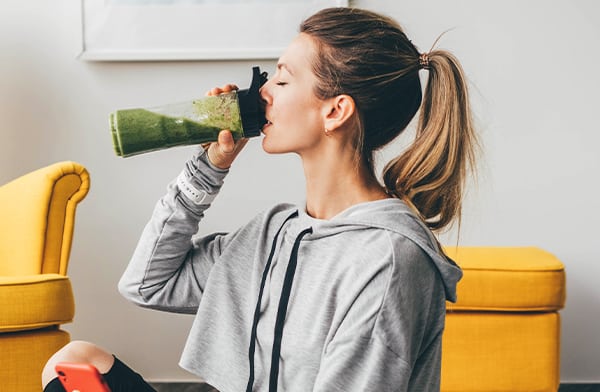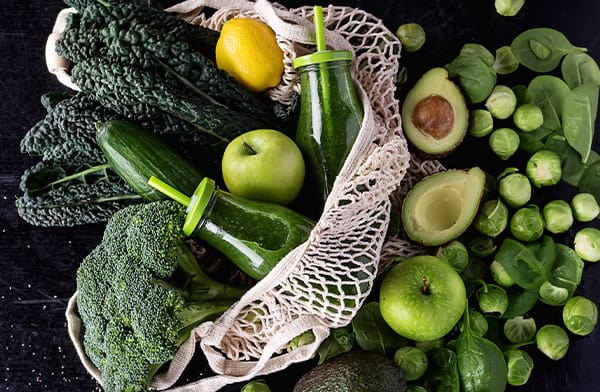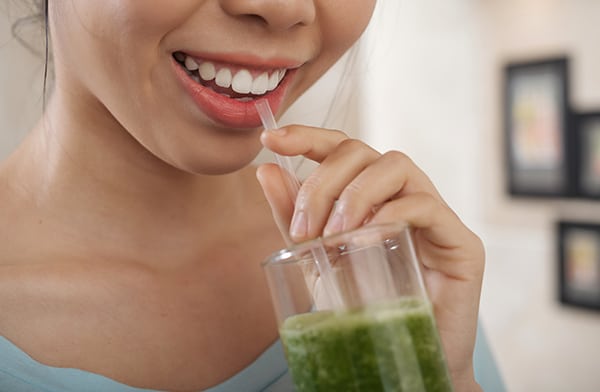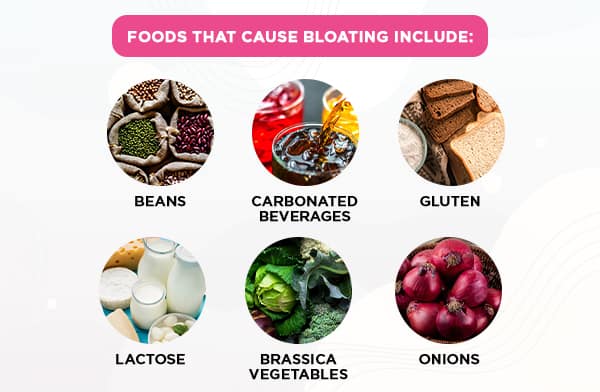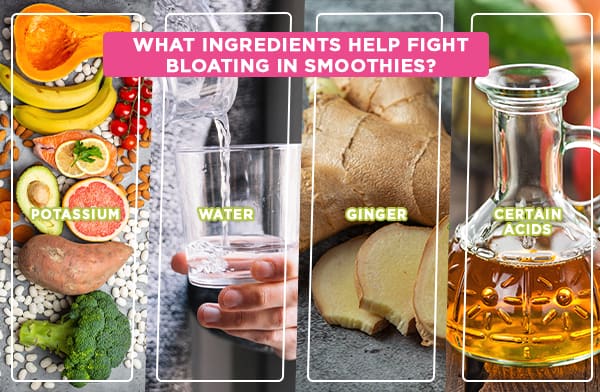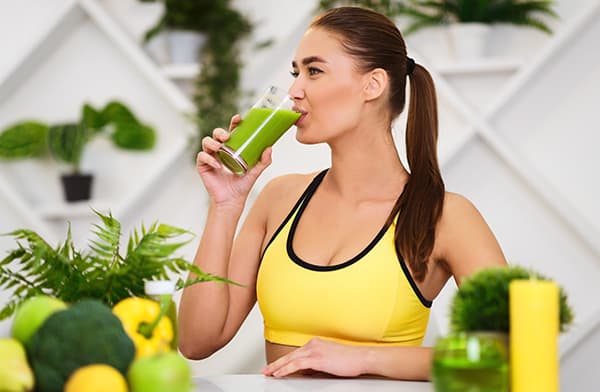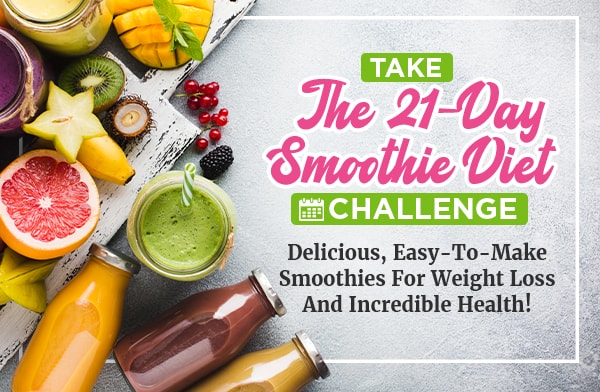6 Ways That Smoothies Can Help You Beat Bloating
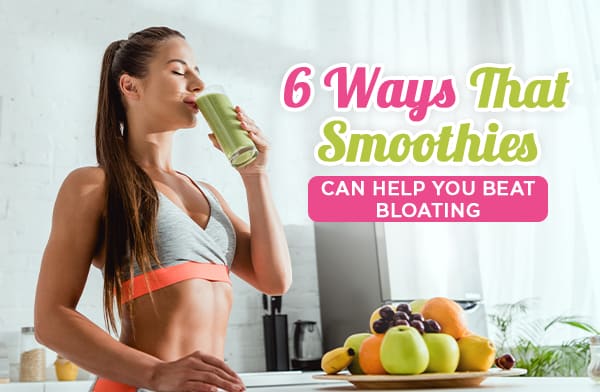
Bloating is one of those symptoms that, if you’ve never experienced it, can be hard to describe. It happens when your digestive tract is full of gas, but it goes above and beyond being gassy. Bloating can feel like you just finished eating a huge meal, even if you haven’t eaten in hours. You feel full, and your stomach might even bulge outwards with the pressure of the built-up air. It can even be painful, as that gas stretches and distends your stomach.
Needless to say, this is very unpleasant even when it isn’t actively painful. Sometimes it’s a sign of something going wrong in your digestive system, like some spoiled food or an ingredient you’re sensitive to. Other times it can be an indication of something worse.
Smoothies can help you deal with bloating, but before I get to how, let’s talk about the medical concerns.
When to See a Doctor
Bloating can happen on its own, or it can occur alongside other symptoms. Bloating on its own is unpleasant and often painful, but it’s not inherently dangerous when it’s temporary. However, if you experience any of these side effects, you should see a doctor:
- Black or bloody stool.
- Abrupt, noticeable weight loss (when you aren’t actively trying to lose weight.)
- Nausea or vomiting.
- Heartburn that gets worse.
- Fever.
These symptoms can indicate that something worse is happening in your digestive system, like an intestinal blockage or perforation, and it’s best to see a doctor before an injury turns into sepsis or another life-threatening ailment.
That said, most cases of bloating are just a side effect of eating something your body disagrees with and will pass in a few hours.
What Causes Bloating?
Bloating is the build-up of gas in your digestive system, but how does that gas get there? Generally, this can happen in three ways.
The first is simply swallowing air. If you eat too fast, you will tend to swallow air along with the food you eat. It’s a small amount of air with each bite, but it builds up, since it has nowhere to go except back up or through you. Since the digestive system can be up to thirty feet long, if you aren’t burping that gas back up, it’s going to linger.
The second reason is some microorganism in your digestive system going wild. Your body is full of bacteria, most of them helpful or benign, and they help break down fiber and starch, which your body can then pull out and use for energy.
Sometimes, though, a bad bacteria goes crazy and starts multiplying. The biggest culprit is usually sugar; overeating sugar and processed flour (also a carb) give those “bad” bacteria a lot of food, so they out-compete the good bacteria. The bad bacteria, when they break down sugars and other nutrients, give off gas. The gas is produced within your body and builds up until it can find a way out.
This is why food sensitivities like gluten intolerance and lactose intolerance often come with a side effect of gassiness, but it can also happen with any normal foods that are packed with sugars.
The third reason is more serious; bloating can be a side effect of some medical conditions. These can range from infections, inflammation, or medication side effects all the way to serious diseases like cancer, Crohn’s, or liver disease. This is another reason why, if you have bloating for more than a day or two, you should consult your doctor.
Six Ways Smoothies Help Fight Bloating
Bloating is unpleasant, and if you experience it frequently, you’re probably looking for a solution. Well, I have one for you: start up the Smoothie Diet.
Smoothies can help you beat bloating, and they work in several different ways. I’ve detailed the six most prominent ways here.
1: Smoothies replace unwholesome ingredients like processed carbs and sugar.
First and foremost, smoothies can help facilitate what is called an “elimination diet.” An elimination diet is a diet where you systematically cut out ingredients to see if those ingredients are the ones causing you problems.
In a typical elimination diet, you will pick a possible ingredient and cut it out for a few days, a week, or longer. You’ll watch your body, your energy levels, and your symptoms; to see if they go away. If they do, you know that ingredient was bad for you. If they don’t, you try again with a different ingredient.
With a smoothie-based elimination diet, you go whole-hog, cutting out most foods other than the healthier dinner you eat each night. From there, you can gradually re-introduce foods, which will make it obvious when you try one, and it causes bloating. You’ll almost certainly discover the problem food quickly with such a method.
2: Smoothies load you up on fiber, to feed good bacteria and smooth digestion.
Up above, I mentioned good and bad bacteria vying for supremacy in your gut. This is called your gut biome, and it’s something we all have. In fact, it’s essential to survival, so much so that there are medical procedures to restore it if it dies off, such as when you have an infection and take strong antibiotics.
Smoothies (at least, good anti-bloating smoothies) are packed with two things that are helpful to your gut biome:
- Prebiotics. Also known as fibers, prebiotics are the food you feed to the good bacteria to help them thrive. Where bad bacteria eat sugars, good bacteria eat fiber.
- Probiotics. Many smoothies contain yogurt or another form of probiotic and can even contain a probiotic supplement if you want. This gives your gut an infusion of good bacteria to keep around.
Fiber is also great for another reason:
3: Smoothies help regulate your digestion and clear blockages.
Fiber is a critical nutrient for your digestive system for more than just feeding bacteria. In fact, your diet should include a reasonable amount of both soluble and insoluble fiber.
Soluble fiber is fiber that absorbs water as it passes through your system. This smooths out and regulates your digestive system. If you suffer from diarrhea, fiber helps absorb some of that liquid and bulk it up. If you suffer from constipation, fiber absorbs more water and softens it, which can help remove blockages.
Insoluble fiber is fiber that doesn’t absorb water and that you generally can’t digest yourself. Some of it feeds bacteria, but for the most part, it just helps add bulk to your stool and helps move it along your digestive tract.
Smoothies, especially those aimed at reducing bloating, typically include plenty of greens like spinach, arugula, or romaine. These greens are high in both kinds of fiber and are an excellent addition to your diet.
4: Smoothies can be high in nutrients that fight bloating directly.
Many of the causes of bloating are chemical reactions in your stomach. Sometimes it’s a reaction to something like lactose, which many people can’t tolerate. Sometimes it’s more of a general reaction to sugars.
Smoothies can deliberately include ingredients designed to stop or inhibit these chemical reactions. Ingredients like cucumbers, bananas, ginger, and apple cider vinegar are all good at fighting bloating, and can help reduce the amount of gas already in your system.
5: Smoothies can have additives that fight gas.
One of the most common causes of bloating is an imbalance in electrolytes. This causes two kinds of bloating: regular, gas-based bloating and water retention. Typically, this form of bloating is caused by too high a sodium level and too low a potassium level. In your body, sodium and potassium (both essential minerals) balance each other out. However, the typical American diet is packed full of way more sodium than anyone needs, and lower levels of potassium.
Many of the smoothie ingredients I recommend are high in potassium without being high in sodium. This adds more potassium to your diet, which cuts back on the effects of sodium, like water retention. When combined with more sources of water to fuel your body, this helps you reduce or avoid bloating altogether.
6: Smoothies virtually never contain gas-causing foods.
There are quite a few foods you eat that cause bloating. Some do so because your body can’t handle them, such as in lactose intolerance. Others have natural chemicals in them that cause bloating for just about everyone.
Foods that cause bloating include:
- Beans. Called the “musical fruit” in a childhood song, for a good reason, beans break down into gaseous compounds when digested.
- Carbonated beverages. Carbonation is literally just gas (CO2, typically) infused and suspended in a liquid. When you drink that liquid, the gas bubbles out. Think of the “Mentos and Coke” effect on a smaller scale, in your stomach.
- Gluten. Some people, particularly those with Celiac disease, are sensitive to gluten and cannot digest it without intense bloating.
- Lactose. Similar to gluten, some people are fine with lactose (the sugar in milk and dairy), while others suffer from eating it. It’s often the first ingredient to cut out when you’re trying to identify the cause of bloating.
- Brassica Vegetables. The entire brassica family of vegetables is generally healthy, but contains some compounds that cause bloating. Brassica vegetables include broccoli, kale, cauliflower, cabbage, brussels sprouts, and more.
- Onions. Onions contain two ingredients that cause or exacerbate bloating: fructans and sulfur compounds. Fructans, in particular, are prone to cause bloating.
The commonality between all of these foods is called FODMAPs. FODMAPs are “Fermentable Oligo-, Di-, Mono-Saccharides and Polyols.” They are short-chain dietary fibers that you can’t digest very easily or at all, and feed the bad bacteria in your gut that give off gasses. Common FODMAPs include fructose (a fruit sugar), lactose (dairy sugar), fructans (a fiber in grains), Galactans (a fiber in legumes), and Polyols (a sugar alcohol). That last one includes common artificial sweeteners like xylitol, sorbitol, and mannitol.
Needless to say, cutting out these ingredients will help cut off bloating at the source. Smoothies are an excellent way to get healthy nutrition in a way that avoids most or all of these ingredients.
What Ingredients Help Fight Bloating in Smoothies?
Smoothies aren’t just about removing the bad ingredients; they can also contain good ingredients that help fight bloating. These ingredients include:
- Potassium. As mentioned, potassium helps fight water retention and encourages your body to use that water, which is otherwise locked away by sodium.
- Water. Water itself is essential for life, and it helps your digestive system function.
- Ginger. The pungent root helps soothe the digestive system and pulls gasses out of it, which is why ginger tablets are a nausea medication and why ginger ale is commonly recommended.
- Certain acids, such as lemon juice, apple cider vinegar, and pineapple juice, can help break down the ingredients causing bloating.
There are a whole host of other ingredients that can help fight bloating as well.
What Smoothies Should You Try?
The truth is, almost any smoothie can work to help relieve bloating, as long as it doesn’t contain the ingredients that cause it in the first place. Typically, that means lactose. That’s why my smoothie recipes use ingredients like coconut milk as a base; and not milk or yogurt. As good as probiotics are, the lactose in a dairy product like yogurt can hurt more than it helps.
If you’re looking to try something new to fight off bloating, water retention, and other health issues, I highly recommend the Smoothie Diet. It’s excellent for eliminating bad ingredients in your diet, as well as junk food, and cutting back on calories. Between reducing water retention, cutting out sugars, and reducing calories, you’re bound to see improvements. You’ll lose weight, you’ll sleep better, you’ll have more energy, and all without weird supplements, medications, or exotic spices.
If you suffer from bloating on a regular basis, give the Smoothie Diet a try; you’ll probably be pleasantly surprised at how effective it is. Just remember those symptoms in the first section, and see a doctor if something worse might be happening deep inside. Additionally, if you ever have any questions or concerns regarding the Smoothie Diet or smoothies in general, please feel free to reach out at any time!


